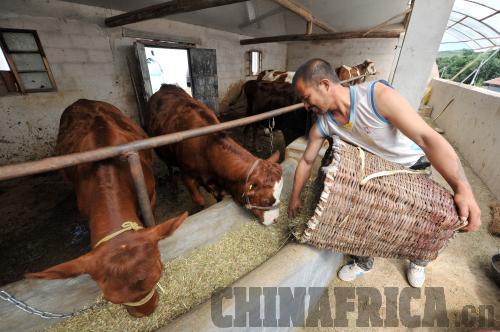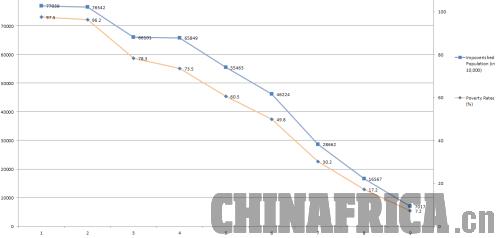| 
Cattle raising is a new industry helping local people out of poverty in Hebao Village, Jingyuan County of Ningxia Hui Autonomous Region

China's achievement in poverty alleviation
Throughout history, poverty has been a millstone around the neck of humanity. It exists in all nations, and governments and civil societies spend much of their time and money trying to address it. While it is no different in China, one aspect of the Chinese anti-poverty campaign stands out. China has committed to eradicating poverty in the next five years.
At the 2015 Global Poverty Reduction and Development Forum in Beijing on October 16, one day ahead of the 23rd International Day for the Eradication of Poverty, Chinese President Xi Jinping said the government will enact more support policies to lift the country's remaining 70 million poor living below its current poverty line out of poverty by 2020.
China has already made considerable improvements in poverty alleviation since the country's reform and opening up in the late 1970s. It has lifted more than 600 million people out of poverty, accounting for about 70 percent of those freed from poverty worldwide. In addition, China was the first developing country to meet the UN Millennium Development Goal of halving the population living in poverty before the 2015 deadline.
"Despite the achievements, China remains the world's biggest developing country, and to narrow the urban-rural gap remains a big challenge for us," Xi said.
Lifting 70 million poor people is no easy task. Though China is now the world's second-largest economy, it still has a big impoverished population, especially in rural areas in central and west China. National Bureau of Statistics data show in 2014, China had 70.17 million impoverished people living under the Chinese poverty line of 2,300 yuan ($376) in annual per-capita net income by 2010 price standards. To help them out of poverty before 2020, it means 14 million people have to be lifted out of poverty in a year, or over 1 million a month.
"This is an arduous task as we are pressed for time," said Hong Tianyun, Deputy Director of the State Council Leading Group Office of Poverty Alleviation and Development. "We cannot achieve that goal unless we take special measures."
Tracking the needy
A precise poverty alleviation program is one of these special measures. According to Hong, China has improved its big data on poverty alleviation to know precisely where the 70 million poor live and the cause of their poverty.
"In the past, we did not know the exact number of people who needed help or their conditions ... [So] even when we took a lot of measures we still failed to help them out of poverty," said Liu Yongfu, Director of the State Council Leading Group Office of Poverty Alleviation and Development.
After a person is identified as living below the poverty line, his or her personal information will be registered in a database. Then they will receive help according to their conditions. Those lifted out of poverty will be removed from the database and those who become poor added.
Thanks to the efforts of thousands of workers, the complicated process of identifying impoverished people has been completed. According to data from the State Council Leading Group Office of Poverty Alleviation and Development, all 70 million have been registered in the database.
Poverty alleviation industry
After analyzing the big data, measures are taken to alleviate poverty in impoverished regions. In some regions, industry-based poverty alleviation has achieved great progress.
While reviewing his gains of 2014, Zhao Zhenlong, a farmer in Huaishuzhuang, a village in north China's Hebei Province, was delighted to see that his income had increased by more than 100,000 yuan ($15,823) from the previous year's. The thin-shell walnuts he grows contributed more than 90,000 yuan ($14,241).
"I couldn't have made so much money without the help of the Greenhill Company," Zhao said.
Established in 1999 in Hebei Province, Greenhill focuses on growing and processing high-quality thin-shell walnuts. In 2008, it initiated a new development mode by linking with cultivation bases, cooperatives and farmers. It provides healthy walnut trees and technological services while farmers do the cultivation. After the harvest, the company collects the walnuts and sells them.
From the precise poverty alleviation database, Greenhill found Zhao in the remote impoverished village deep in the Taihang Mountains in 2013. It provided Zhao with mature walnut trees for free. "We hoped to make Zhao's walnut farm an example so that more farmers would follow him and get out of poverty by growing our thin-shell walnuts," said Zhang Kang, Office Director of Greenhill.
Encouraged by Greenhill, a large number of cooperatives were established and farmers became workers of these cooperatives.
Achieving a breakthrough
In June, President Xi, in Guizhou on inspection, said poverty relief in underdeveloped rural areas was key for economic development nationwide. Underlining "high precision," he called for policies based on different local situations and different causes of poverty.
"We have different ways to alleviate poverty for people in different regions, depending on their conditions and cause of poverty," said Huang Chengwei, Deputy Director of the International Poverty Reduction Center in China at Global Poverty Reduction and Development Forum in Beijing in October. "The most important thing is to find the area where you can make a breakthrough."
Anhua County in Hunan Province, home to China's dark tea, is an important growth base. It has used the dark tea industry to achieve that breakthrough in its poverty alleviation programs.
"The dark tea industry has become an important point in our precise poverty alleviation program. The central and provincial governments provided us with support policies," said Xiong Zhewen, county chief, at the Dark Tea Cultural Festival in Beijing on October 14. "Thanks to the dark tea industry, many farmers have got rid of poverty."
County government data show the number of poor in the county decreased from 653,000 in 1993 to 133,800 in 2014. Farmers' per-capita net income increased from 677 yuan ($107) to 6,196 yuan ($980.4) during the same period.
International cooperation
While striving to reduce poverty at home, China also supports the cause in other developing countries. Under the framework of South-South Cooperation, China provides affordable aid to other developing countries with no political conditions attached.
According to Xinhua, in the past 60 years, China has provided nearly 400 billion yuan ($63.3 billion) in assistance to 166 countries and international organizations, written off interest-free inter-governmental loans to heavily indebted poor countries on seven occasions, and given medical support to 69 countries in Asia, Africa, Latin America, the Caribbean and Oceania.
At a United Nations summit in September, Xi pledged an initial $2 billion to establish an assistance fund to help developing nations fight poverty. He promised more support for improvements in agriculture, trade, environmental protection, medical services and education.
"The UN welcomes those significant and generous proposals from President Xi and looks forward to further progress in an indispensable partnership with China," UN Secretary General Ban Ki-moon said in response.
niyanshuo@chinafrica.cn
|